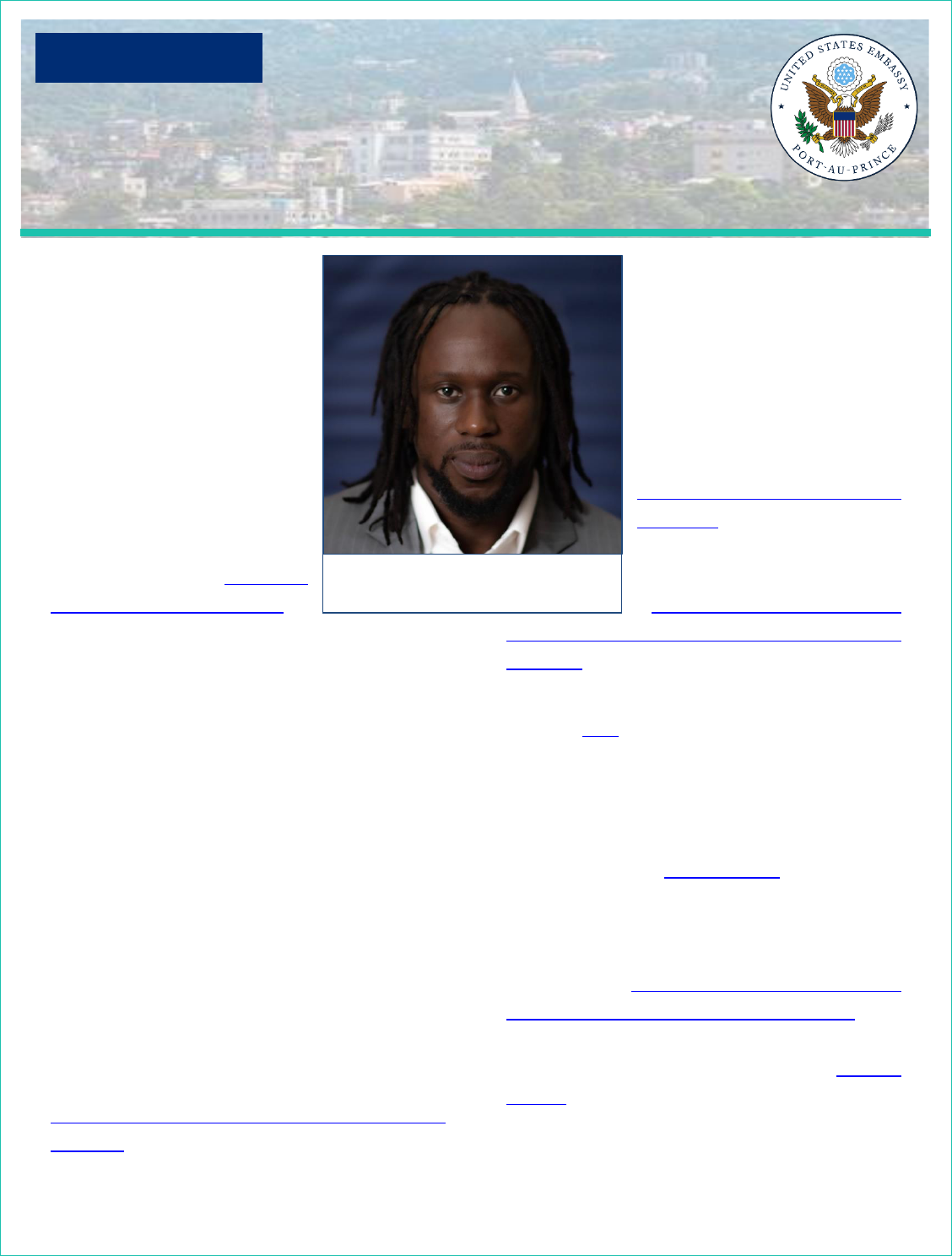
Hello, everyone. I’m Umar
Moulta-Ali, the new Fraud
Prevention Manager at the U.S.
Embassy in Port au Prince. I just
arrived in Haiti last month and am
happy to be serving here. I
previously served in Consular
sections in Trinidad and Tobago
and China.
September is National
Preparedness Month, designated
by President Joseph R. Biden to
raise awareness about the importance of preparing
for disasters and emergencies that could happen at
anytime. This year’s theme is “Prepare to Protect.
Preparing for disasters is protecting everyone you
love.” In his statement, President Biden said, “I call
on everyone to get vaccinated, turn on emergency
alerts on your smartphone, pack an emergency go-
bag, and encourage others in your community to do
the same.” This advice is especially applicable in
Haiti, as just in the past year, Haitians have
experienced a major earthquake, one of the most
active hurricane seasons on record, and COVID-19,
among other emergent crises. Our newsletter
includes information on hurricane prepardeness and
creating a go-bag, but preparation can also include
financial readiness, plans for pets and animals, and
building your own safety skills. You can visit the
Federal Emergency Management Agency’s Ready
campaign for free information and resources on
these topics to help you and your
family “Prepare to Protect.”
Many of you have been following
the U.S. Government’s response to
the August 14 earthquake. The U.S.
Department of Defense’s Southern
Command (SOUTHCOM)
completed its earthquake relief
operations earlier this month.
Meanwhile, USAID’s Disaster
Assistance Response Team (DART)
is continuing to coordinate with the
Haitian government to get Haitians the assistance
they need.
The State Department’s Smart Traveler Enrollment
Program (STEP) helps the U.S. Embassy contact you
in an emergency, in addition to providing alerts
about local safety conditions. I encourage all U.S.
citizens traveling and living in Haiti to enroll in this
free service, especially since Haiti continues to have
the highest (Level 4) Travel Advisory, “do not travel”
due to kidnapping, crime, civil unrest, and COVID-19.
If you must travel, the CDC recommends you are fully
vaccinated. This month’s “Ask the Consul” section
focuses on new COVID-19 vaccine requirements for
immigrant visa applicants starting October 1. You
can find a list of COVID-19 vaccine distribution sites,
across all 10 departments in Haiti, on the Embassy
website.
Stay informed, stay connected, and stay safe!
September 2021
Consular Newsletter
Pictured: Umar Moulta-Ali
Fraud Prevention Manager
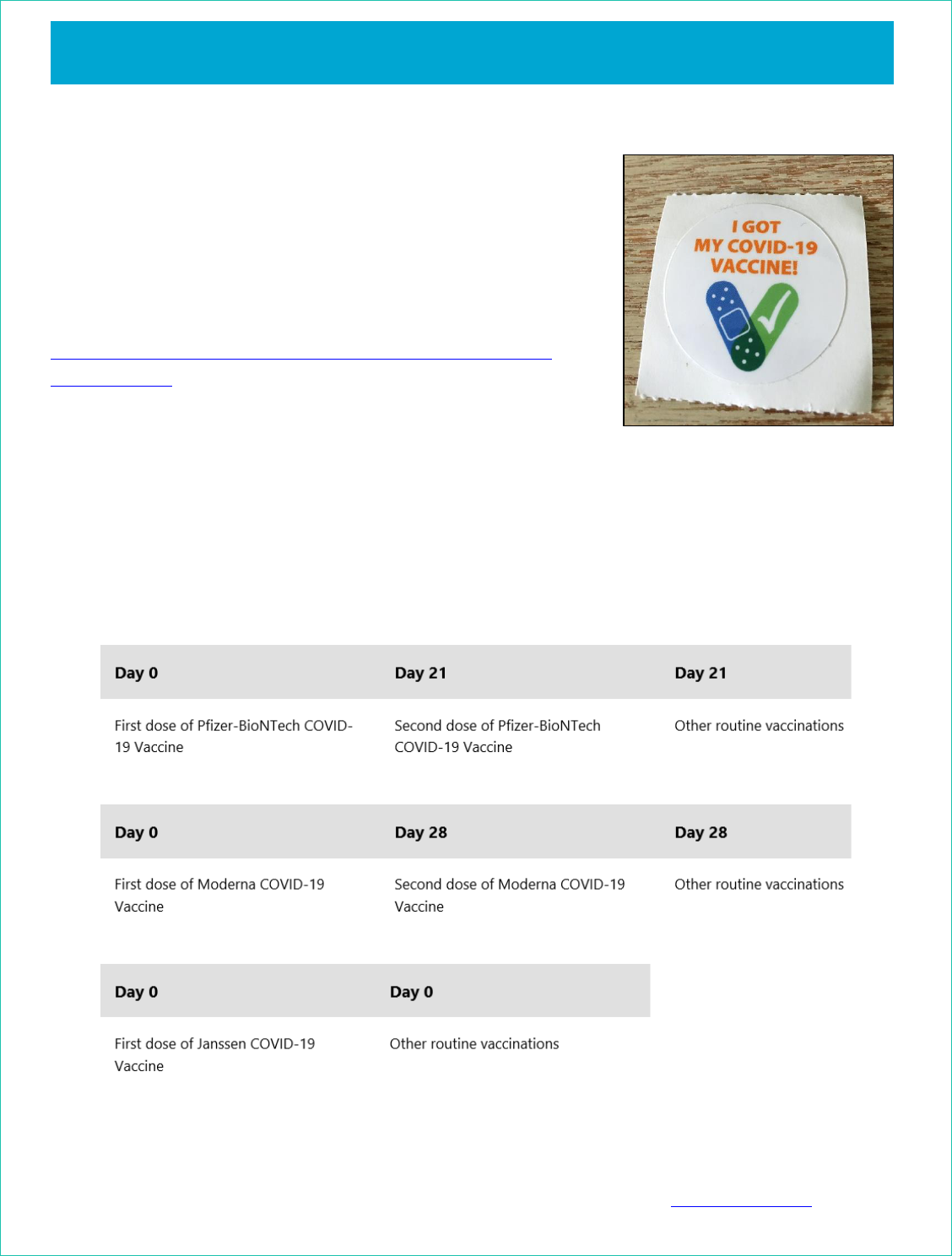
2
Each month we’ll be answering some of your frequently asked questions. For September, we’re focusing on the
new COVID-19 vaccine requirements for immigrant visa applicants and general information about COVID-19
vaccination options in Haiti.
Q: What are the new vaccine requirements for immigrant visa applicants
and when do they start?
A: Effective October 1, a completed COVID-19 vaccine series is required as part
of the U.S. immigrant visa medical examination. Full information about this
new requirement can be found on the CDC website at:
cdc.gov/immigrantrefugeehealth/panel-physicians/covid-19-technical-
instructions.html .
Q: When should immigrant visa applicants get vaccinated against COVID-
19?
A: Now! Although the requirements for immigrant visa applicants to be fully vaccination against COVID-19 do not
begin until October 1, most vaccines require two shots spaced several weeks apart for one to be considered fully
vaccinated. Immigrant visa applicants should not wait until their medical exam date or interview date to schedule their
first or second vaccine dose, in that the entire vaccine series (1 or 2 doses depending on formulation) must be
completed in addition to the other routinely required vaccines. An example timeline for the Pfizer-BioNTech, Moderna,
and Janssen (Johnson & Johnson) COVID-19 vaccines and other required vaccinations is illustrated below. The
Moderna vaccine is currently available in Haiti.
Q: Where and when can I get vaccinated in Haiti?
A: COVID-19 vaccines are currently available in all 10 of Haiti’s Departments. The Haitian Health Ministry regularly reports
the updated list of vaccination sites and operating hours, which is also available via the Embassy’s website.
Ask the Consul: New COVID-19 Vaccine Requirements
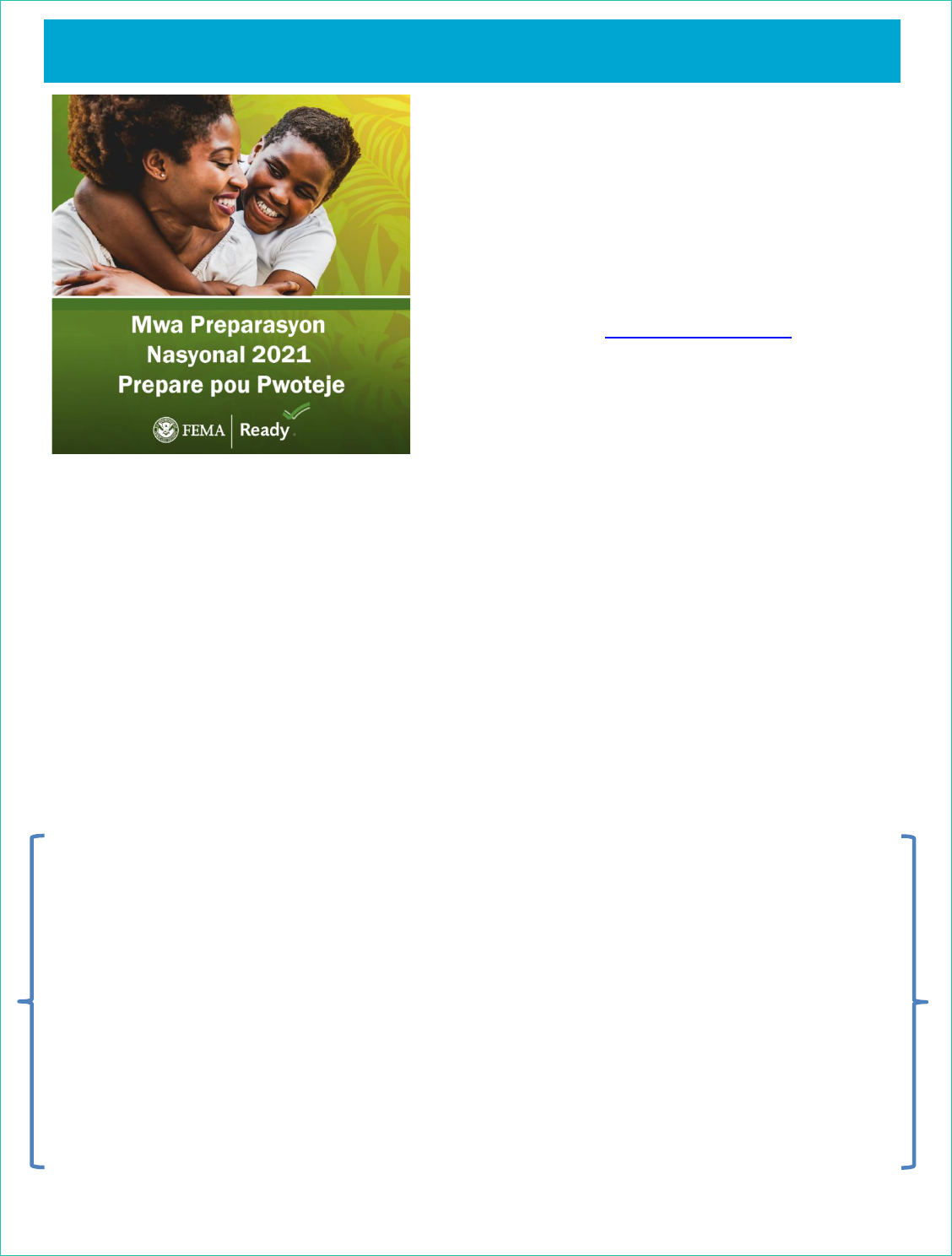
3
National Preparedness Month is an observance each
September to raise awareness about the importance of
preparing for disasters and emergencies that could
happen at any time. The 2021 theme is “Prepare to
Protect. Preparing for disasters is protecting everyone
you love.”
You can visit the Federal Emergency Management Agency
(FEMA) website, Ready.Gov/September, for free
resources, like videos, a Preparedness Portal, and local
emergency management information to help you prepare
and protect.
There are four key aspects of preparedness for individuals, families, and communities:
1. Make a Plan: Talk to your friends and family about how you will communicate before, during, and
after a disaster.
2. Build a Kit: Gather supplies that will last for several days after a disaster for everyone living in your
home.
3. Low Cost, No-Cost Preparedness: Natural disasters don’t wait for a convenient time. Start preparing
for them today by taking low cost and no cost preparedness actions, like signing up for alerts and
safe-guarding important documents.
4. Teach Youth About Preparedness: Talk to your kids about preparing for emergencies and what to
do in case you are separated.
The following is an excerpt from the White House’s Proclamation on National Preparedness Month, 2021:
“Becoming more disaster-resilient as a country—and more prepared as a people—is essential for
our continued strength and security. During National Preparedness Month, we encourage all
Americans to take the important steps to prepare for natural and human-made threats and to
ensure that all our communities are ready for any emergency. As we prepare for natural disasters
and address the accelerating climate crisis, we must also remain vigilant to prevent, detect, and
respond to infectious disease threats, including the COVID-19 pandemic and threats that will arise
in the future. Even as more than 174 million Americans have been fully vaccinated—with hundreds
of thousands continuing to get vaccinated each day—the more transmissible Delta variant is
spreading, particularly among unvaccinated individuals. I continue to call on Americans to protect
themselves and those around them by getting vaccinated. The vaccines are safe. They are
effective. And together, we can save lives.”
~President Joseph R. Biden, Jr.
National Preparedness Month
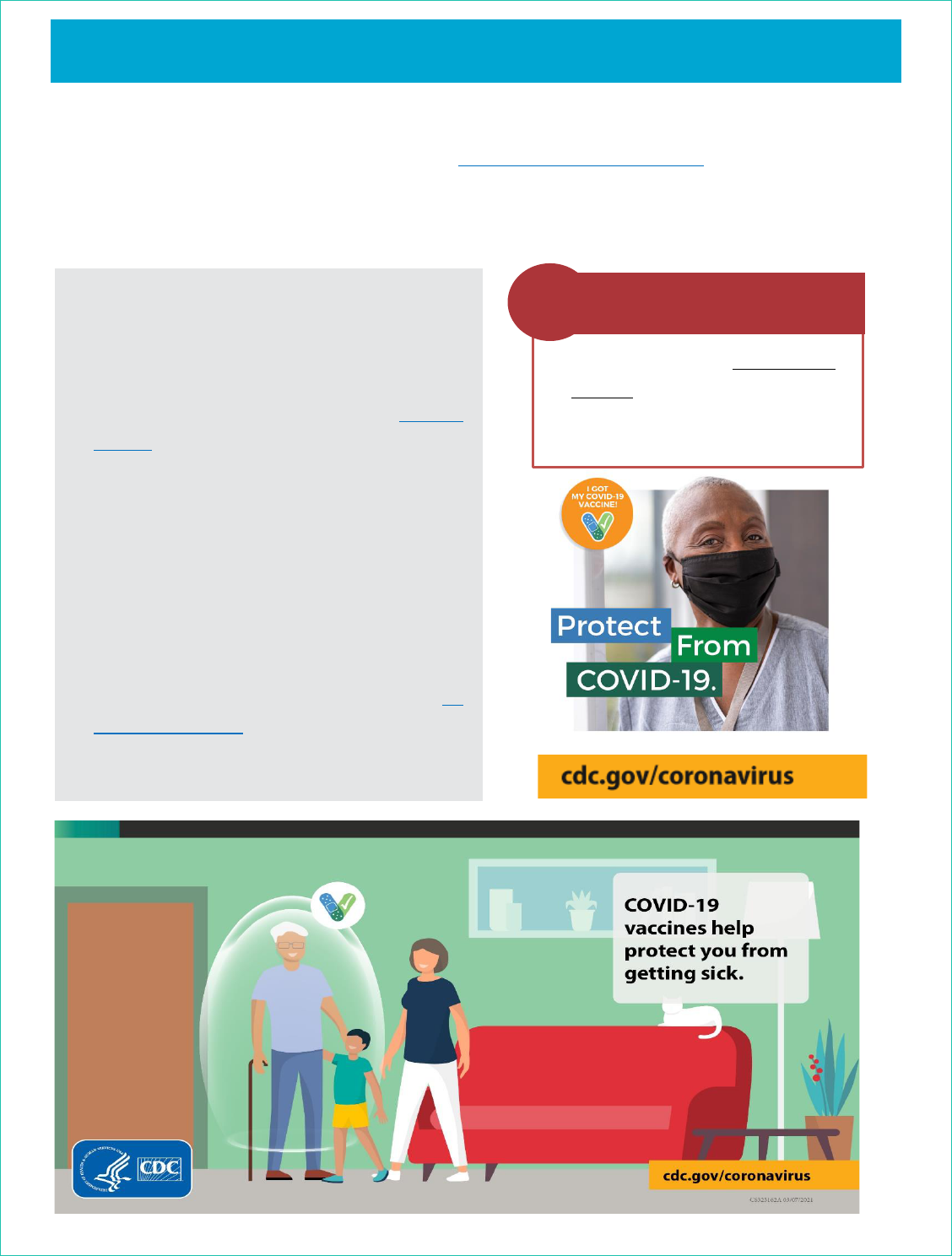
4
COVID-19: For updated information about COVID-19 in Haiti, including where to get vaccinated, where to get tested,
entry/exit requirements, and quarantine information, please visit the Embassy website. The COVID-19 vaccine is
currently available in Haiti at more than 50 locations, in various cities. The U.S. Government does not plan to
provide COVID-19 vaccinations to private U.S. citizens overseas. Please continue to follow host country
developments and guidelines for COVID-19 vaccination.
Health Resources & COVID-19
Additional health guidance:
Make sure you are current on your vaccines,
including tetanus and rabies.
Know where doctors and the closest emergency
room are in your area. Please visit the Embassy
website for a list of hospitals and medical
professionals in Haiti.
Always keep basic medications and supplies on
hand. Invest in a quality first aid kit and keep one
in your car and at home.
Always have medical insurance, including
medevac insurance. If you need to be medically
evacuated out of Haiti, you should contact a
medevac company or an air ambulance service.
Visit the U.S. Embassy website for a list of Air
Ambulance Services.
Haiti – Level 4:
Very High Level of COVID-19
4
The CDC has issued a Level 4 health
advisory for Haiti. Avoid travel to
Haiti. If you must travel to Haiti,
make sure you are fully vaccinated.
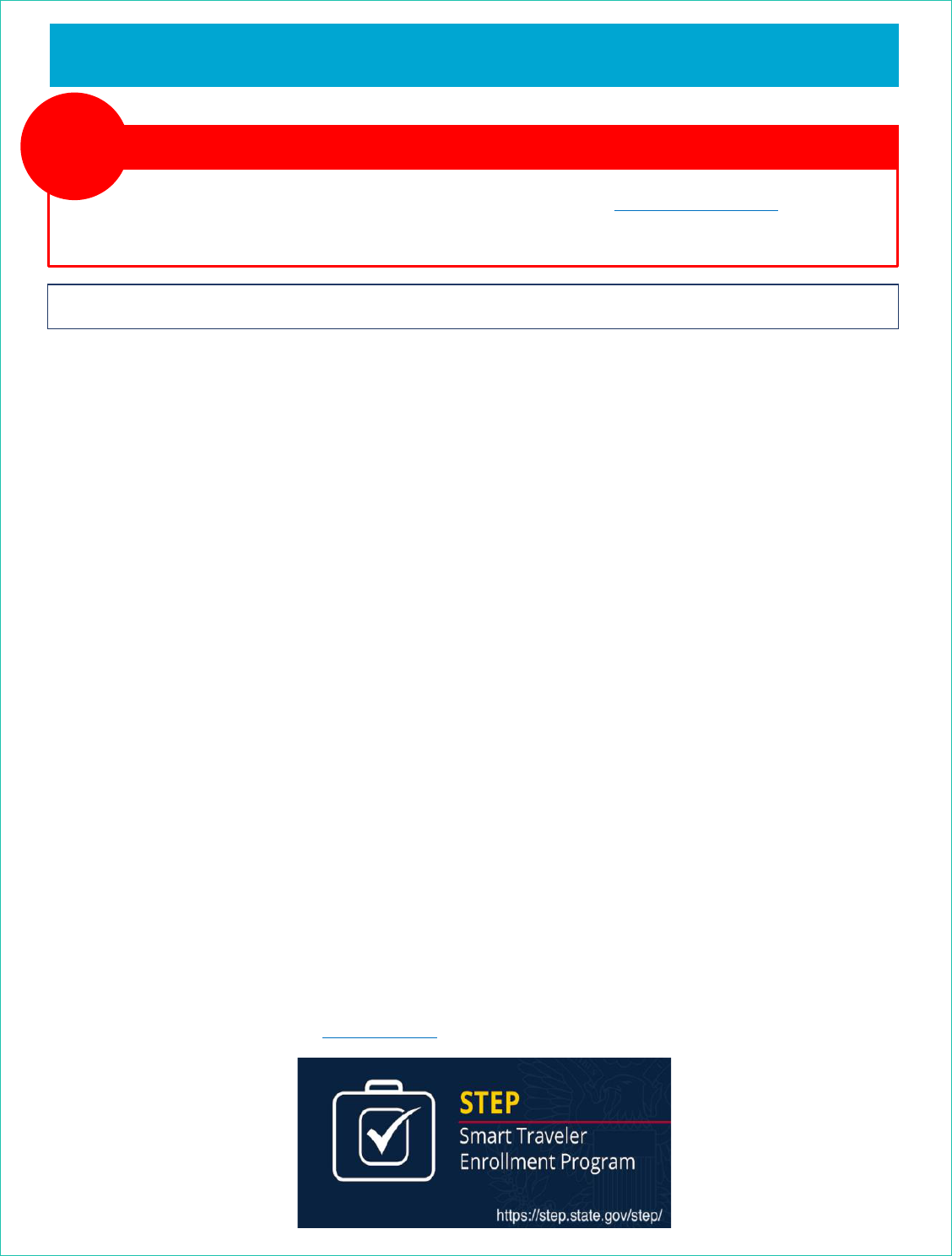
5
If you are in Haiti…
Haiti – Level 4: Do Not Travel
4
The U.S. Department of State has renewed the highest level “Level 4: Do Not Travel”
travel advisory for Haiti due to kidnapping, crime, and civil unrest, and COVID-19.
• Remember that demonstrations, tire burning, and roadblocks are frequent, unpredictable, and can
turn violent at any time. Emergency response, including ambulance service, is limited or non-
existent.
• Always carry your cell phone and ensure it is charged before you travel. Ensure you have important
numbers programmed into your phone. Consider using code names for family or friends.
• Avoid demonstrations and crowds. If you encounter a roadblock, turn around and get to a safe
area.
• Arrange airport transfers and hotels in advance, or have your host meet you upon arrival.
• Travel by vehicle to minimize walking in public, and travel in groups of at least two people,
whenever possible.
• Always keep vehicle doors and windows locked, with valuables out of sight.
• Exercise caution and alertness, especially when driving through markets and other traffic-
congested areas.
• Do not physically resist any robbery attempt/kidnapping.
• Do not travel in areas unfamiliar to you and be aware that navigation apps are highly unreliable in
Haiti.
• Always make sure your vehicle is in good driving condition.
• Travel at times when traffic is expected to be lighter and avoid travel after dark in Port au Prince.
• Ensure adequate spacing between vehicles to provide options for evading a potentially dangerous
situation.
• Patronize shops or restaurants that provide secure, enclosed, and well-lit parking.
• Always inform someone, such as a family member or friend, of where you are going and what time
you expect to return. Minimize broadly publishing your travel plans on social media.
• Enroll in the Smart Traveler Enrollment Program (STEP) to receive important information from the
Embassy about safety conditions in Haiti, and help the Embassy contact you in the case of
emergency. To enroll, visit: step.state.gov, or click the image below.
Travel & Security
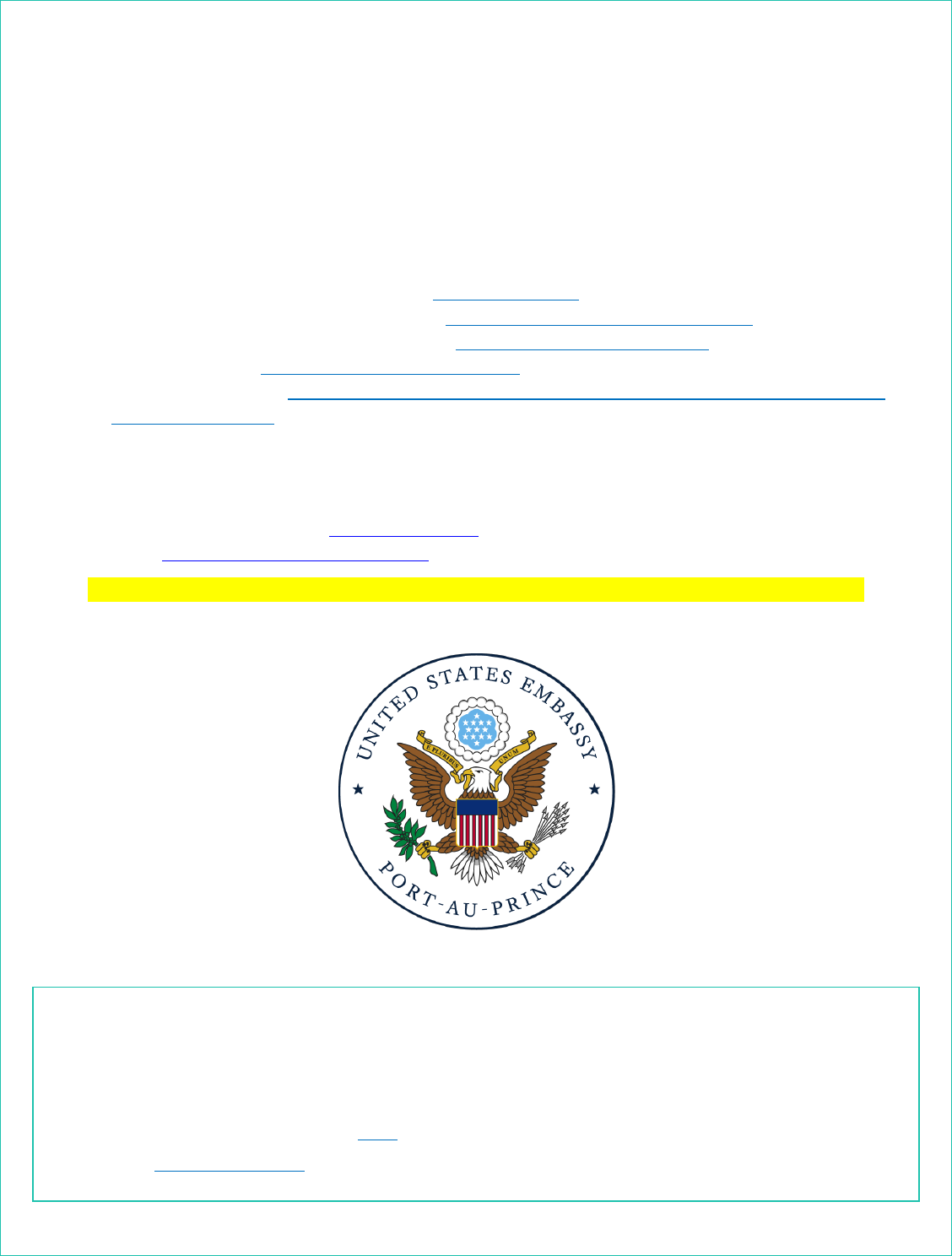
6
CONTACT INFORMATION
Embassy Address:
U.S. Embassy Port au Prince
Boulevard du 15 Octobre
Tabarre 41, Route de Tabarre, Port au Prince, Haiti
Online Resources:
✓ U.S. Embassy Port au Prince’s website: ht.usembassy.gov
✓ American Citizen Services (ACS) website: ht.usembassy.gov/u-s-citizen-services
✓ U.S. Embassy Port au Prince on Facebook: facebook.com/USEmbassyHaiti
✓ ACS on Facebook: facebook.com/ACSPortauPrince
✓ Haiti Travel Advisory: travel.state.gov/content/travel/en/traveladvisories/traveladvisories/haiti-
travel-advisory.html
To respond to your inquiry most effectively, we strongly encourage you to write to our topic-specific e-
mail addresses as follows:
✓ American Citizen Services: acspap@state.gov
✓ Visas: [email protected]
In case of a life or death emergency regarding U.S. citizens in Haiti, please call: +509-2229-8000
Disclaimer: This newsletter is published by the Consular section of the U.S. Embassy in Port au Prince as a
service for U.S. citizens living or traveling in Haiti. It provides security and other general information to
people who have subscribed by enrolling with the Embassy. Please feel free to pass it along to other
interested people. If you would like to receive your own copy directly, enroll with the Embassy through the
Smart Traveler Enrollment Program (STEP). Comments and suggestions regarding this newsletter are
welcomed at [email protected].
